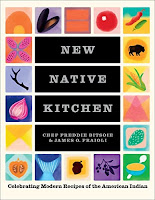by Freddie Bitsoie
New York; Abrams, 2021. 287 pages. Nonfiction. Cookbooks
From Freddie Bitsoie, the former executive chef at Mitsitam Native Foods Café at the Smithsonian's National Museum of the American Indian, and James Beard Award-winning author James O. Fraioli, New Native Kitchen is a celebration of Indigenous cuisine. Accompanied by original artwork by Gabriella Trujillo and offering delicious dishes like Cherrystone Clam Soup from the Northeastern Wampanoag and Spice-Rubbed Pork Tenderloin from the Pueblo peoples, Bitsoie showcases the variety of flavor and culinary history on offer from coast to coast, providing modern interpretations of 100 recipes that have long fed this country. Recipes like Chocolate Bison Chili, Prickly Pear Sweet Pork Chops, and Sumac Seared Trout with Onion and Bacon Sauce combine the old with the new, holding fast to traditions while also experimenting with modern methods. In this essential cookbook, Bitsoie shares his expertise and culinary insights into Native American cooking and suggests new approaches for every home cook. With recipes as varied as the peoples that inspired them, New Native Kitchen celebrates the Indigenous heritage of American cuisine.
What a wonderful celebration of Native American cuisine and culture. I appreciate the time and effort put taken to weave history and culture into what could have been a stellar cookbook all on it's own. I want to try every recipe in here! Highly recommend this one.
If you like New Native Kitchen, you might also like...
by Sean Sherman
University of Minnesota Press, 2017. 256 pages. Nonfiction. Cookbook.
2018 James Beard Award Winner: Best American Cookbook Named one of the Best Cookbooks of 2017 by NPR, The Village Voice, Smithsonian Magazine, UPROXX, New York Magazine, San Francisco Chronicle, Mpls. St. PaulMagazine and others Here is real food—our indigenous American fruits and vegetables, the wild and foraged ingredients, game and fish. Locally sourced, seasonal, "clean" ingredients and nose-to-tail cooking are nothing new to Sean Sherman, the Oglala Lakota chef and founder of The Sioux Chef. In his breakout book, The Sioux Chef's Indigenous Kitchen, Sherman shares his approach to creating boldly seasoned foods that are vibrant, healthful, at once elegant and easy. Sherman dispels outdated notions of Native American fare—no fry bread or Indian tacos here—and no European staples such as wheat flour, dairy products, sugar, and domestic pork and beef. The Sioux Chef's healthful plates embrace venison and rabbit, river and lake trout, duck and quail, wild turkey, blueberries, sage, sumac, timpsula or wild turnip, plums, purslane, and abundant wildflowers. Contemporary and authentic, his dishes feature cedar braised bison, griddled wild rice cakes, amaranth crackers with smoked white bean paste, three sisters salad, deviled duck eggs, smoked turkey soup, dried meats, roasted corn sorbet, and hazelnut–maple bites.The Sioux Chef's Indigenous Kitchen is a rich education and a delectable introduction to modern indigenous cuisine of the Dakota and Minnesota territories, with a vision and approach to food that travels well beyond those borders. chooses the beans.
by Rick Martinez
Clarkson Potter/Publishers, 2022. 303 page. Nonfiction. Cookbook.
In this beautifully personal tribute, Rick expresses Mexico's regionality through dishes like Oaxaca's Mole Coloradito (a rich pasilla chile sauce made with dried fruits, nuts, and seeds and sweetened with plantain and bittersweet chocolate) and Tacos de Capeados (cornmeal-battered fried fish tacos with papaya, tomatillo, and a spicy cream sauce) from coastal Baja. He delivers recipes based on his favorite home-tested version of each dish, veering from tradition when inspired-- like in the Tlayuda con Tasajo in which a flank steak is marinated with miso paste before being grilled and added to a large tostada topped with refried beans and queso Oaxaca. Rick always keeps accessibility in mind when speaking to the availability of ingredients such as chiles, spices, and herbs--he often calls for or talks about what is traditional and provides substitutions and replacements when needed. In addition to the captivating recipes, Rick includes essays on topics like the migration and culinary influence of people from the Middle East and China to Mexico, and his experiences of finding welcomeness, support, and a feeling of belonging in his new home in Mazatlán. The collective result is touching, transportive, and delicious
NS



No comments:
Post a Comment